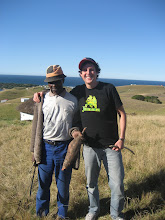Sunday, July 19, 2009
Peter Singer: Why We Must Ration Health Care
"It’s one thing to accept that there’s a limit to how much we should spend to save a human life, and another to set that limit."
Peter Singer: Why We Must Ration Health Care
http://www.nytimes.com/2009/07/19/magazine/19healthcare-t.html?_r=2&hpw
"You have advanced kidney cancer. It will kill you, probably in the next year or two. A drug called Sutent slows the spread of the cancer and may give you an extra six months, but at a cost of $54,000. Is a few more months worth that much?
If you can afford it, you probably would pay that much, or more, to live longer, even if your quality of life wasn’t going to be good. But suppose it’s not you with the cancer but a stranger covered by your health-insurance fund. If the insurer provides this man — and everyone else like him — with Sutent, your premiums will increase. Do you still think the drug is a good value? Suppose the treatment cost a million dollars. Would it be worth it then? Ten million? Is there any limit to how much you would want your insurer to pay for a drug that adds six months to someone’s life? If there is any point at which you say, “No, an extra six months isn’t worth that much,” then you think that health care should be rationed."
Saturday, July 18, 2009
A Great Dilemma
While I have said we must bridge the gap between public health and community medicine. This poses a personal, ethical dilemma: When faced with limited resources to improve peoples' health, as a public health practitioner one would believe that you use resources to help improve the health of as many people possible (This is the classical utilitarian view). As a medical practitioner when faced with the same dilemma, ones duty is to his/her patient. The question is at what cost? Is there a cost that would prevent you from treating any one patient knowing that those resources could be distributed to help many more (Peter Singer frames this question more eloquently)?
I welcome comments as this is truly a great ethical dilemma for all of us. It applies to health resources and aid for the poor, health care rationing in this country........etc. I also wonder if there is a different way to frame the issue of limited resources. While in theory, I have posed conflicting views, in practice can't we be utlitarians that are also dedicated to the health and well being of individual patients and vice versa? Under what circumsatnces should we act as one rather then the other?
Advocay
I have talked a lot about individual patients and the importance of being patient centered. But I am also beginning to learn while it might be less glamorous, less rewarding in any immediate sense, we must be advocates for our patients.
We must be advocates for better housing, better shelters, better mental health and substance abuse services.
We must have the ear of politicians, community action boards, and hospital administrators
We must bridge the gap between public health and community, frontline medicine; Too often there seems a great void.
Thursday, July 9, 2009
12
This is the number of CD4 T-cells that one of our patients has. A healthy person has 500+. At 12 T-cells your immune system has completely collapsed, your body is constantly overwhelmed by bacterial and fungal infections, you our on the verge of death.
A nurse once visited a patient of ours in the hospital with 1 T-cell, his body completely indefensible, but he was nursed back to health, and today I have the pleasure of listening to his Haitian music at least once a week.
This is a reminder of why we do this work.
But today, our patient with 12 T-cells has no interest in taking medications. He will soon die. All we can do is ease his suffering.
This is also why we do this work.
Saturday, July 4, 2009
Anthropology
I have been reading a lot about medical anthropology of late-especially this idea that while anthropology in itself is an academic pursuit, an anthropological perspective to medicine and public health is extremely practical and useful. I have learned a lot about this practice from Paul Farmer's works and his experience in Haiti, but it also applies to my work this year in San Francisco.
Two examples come to mind: One is the understanding of punk rock culture and its influence on a number of our homeless and chronically drug-addicted patients. The second is the influence of the gay rights movement, and gay subcultures in San Francisco, on patients that engage in sexual activities that put them at high risk for HIV infection.
While I am sure books have been written on these subjects, I think it is important to understand how these social and cultural movements influence the health, life, and identities of our patients.
You cannot do motivational interviewing with a Punk Rocker if you don't know what Punk Rock is all about (I still have a lot to learn). It is difficult to do effective harm reduction counseling with a gay man that doesn't use condoms if you don't at least bring up ideas of sexual liberation and the history of HIV in the San Francisco gay community.
You have to talk about peoples identities, and how those identities relate to their health and well being. I believe the study of anthropology helps you do this.
Subscribe to:
Comments (Atom)
